Best Water Purifiers
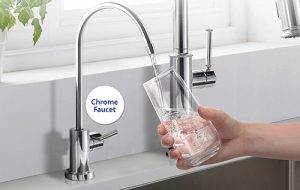
Water is believed to be a symbol of purity, simplicity, and ease. If only its symbolism were true to reality.
These days, in many cases, if not every case, water isn’t as clean as it should be. The water coming out of your taps contains bacteria, microorganisms and even in some cases, dirt, mud, and sand. This is the water you drink and use to clean your dishes and food.
To remove all these impurities from your drinking water and other uses, the ideal solution is to invest in a water purifier. This removes all the dirt and bacteria for you, giving you a consistent stream of clean water.
| Rank | Product | Highlights |
| #1 |
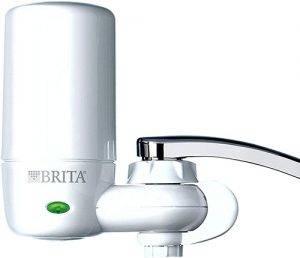 Brita Basic Faucet Water Filter System |
|
| #2 |
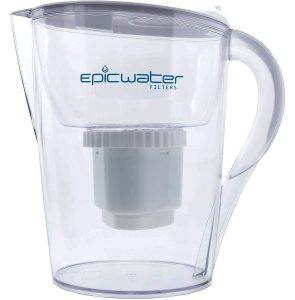 Epic Pure Water Filter Pitcher for Drinking Water |
|
| #3 |
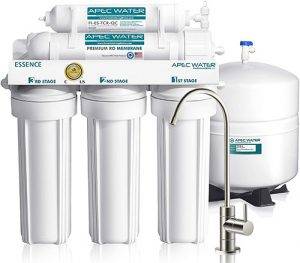 APEC Water Systems ROES-50 |
|
| #4 |
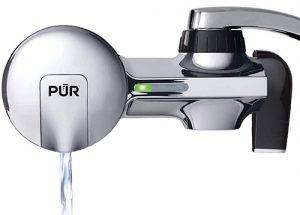 PUR PFM400H Faucet Water Filtration System |
|
| #5 |
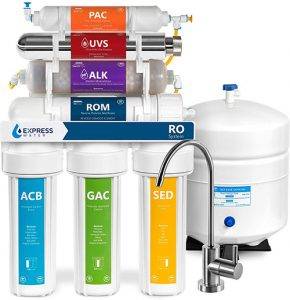 Express Water UV Reverse Osmosis |
|
Table Of Contents
- Why Buy a Water Purifier?
- What Can You Find in Unpurified Water?
- Soft Water vs Hard Water
- Water Purifier Types
- Scale for Which Purifier to Use
- Best Water Purifier Reviews
- 1. Brita Basic Faucet Water Filter System
- 2. Epic Pure Water Filter Pitcher for Drinking Water
- 3. APEC Water Systems ROES-50 Essence Series Reverse Osmosis Drinking Water Filter System
- 4. PUR PFM400H Faucet Water Filtration System
- 5. Express Water UV Reverse Osmosis Water Filtration System
- Conclusion
Why Buy a Water Purifier?
Water purifiers can quite literally save you from all that untreated water carries. There could be potentially life-threatening waterborne diseases hovering in your cup, or unwanted bacteria waiting to be consumed.
Dirty water carries various particles, some microscopic, others large enough to identify visibly. These larger specks can scratch your kitchen utensils while you’re cleaning and leave crumbles in your glasses when you’re done drinking.
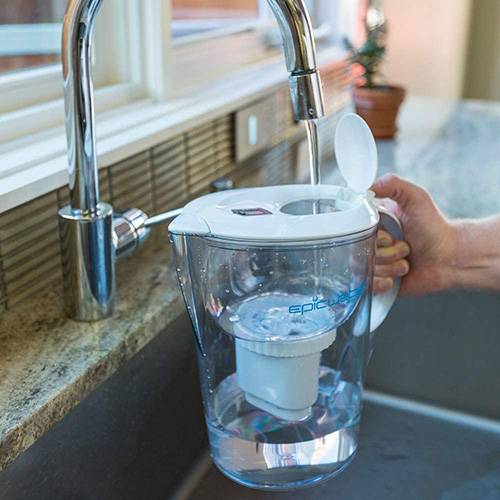
On the other hand, there is the ultimate benefit of a water purifier at home. You don’t need to rely on bottled water for clean drinking water.
Millions of plastic water bottles are thrown out every year instead of recycled, creating litter in the oceans. These bottles serve for one serving, and then join the cycle of waste. Rather than relying on water bottles, you can have your at-home purification system which provides you with clean water on a daily basis.
This can also save you hundreds of dollars since water purification systems are a one-time investment replaced after years of usage. Water bottles are a temporary purchase consumed numerous times a day and their bills pile up.
What Can You Find in Unpurified Water?
If you’re still not convinced that you need a purification system, here are some things you can find in regular water.
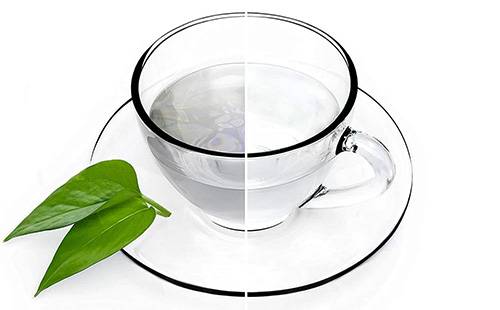
- In worst-case scenarios, you can find a collection of sand and mud polluting your tap water. It’ll collect at the base of your sink and turn your water from clear to light-to-dark brown.
- Decontaminants that were primarily used during the process of cleaning water may still be present, such as chlorine. This creates a strong odor and taste and shouldn’t be in every glass of water you have.
- Finally, there are bacteria and viruses, unseen but ever-present. They can carry diseases right to your home without ever being detected and cause serious harm to your well-being.
All these impurities can be avoided by simply purchasing the right water purification system for your home. So why not find the ideal investment for yourself?
Soft Water vs Hard Water
An important part of choosing your ideal filter is knowing what type of water you’re dealing with. Knowing what can be found in water is all well and good, but certain filters are constructed for certain water types, either soft or hard water.
Water is measured and then categorized by the number of dissolved solids found in a certain volume. This measure is known as TDS. It’s also displayed with a ppm (parts per million) measurement.
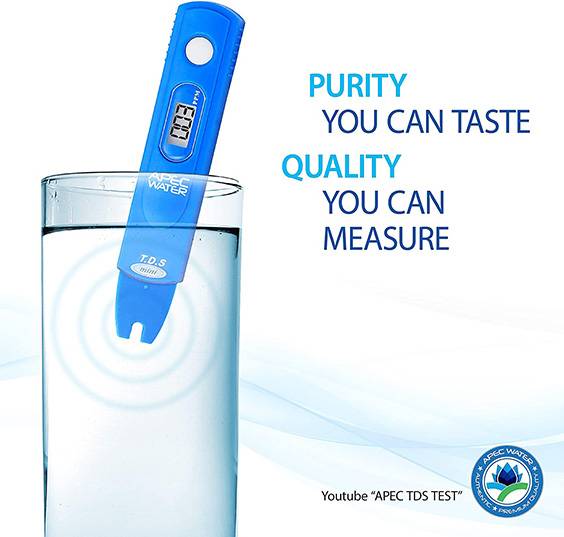
If your water has a TDS of 150 to 300 ppm, then it’s considered soft water. This water is relatively cleaner with less identifiable solid particles, but it should still be cleaned for bacteria that have fully dissolved into the water.
Water with a TDS of higher than 500 ppm is considered hard water. This is where you can start seeing impurities floating in your water. There are also contaminants in your water that can dirty and rust your faucets and showerheads. Naturally, this also means the water isn’t compatible with drinking.
Water Purifier Types
— Reverse Osmosis Purifiers
The first and most commonly viewed filter type is Reverse Osmosis Purifiers. (Also known as RO Membranes)
To understand how these purifiers operate, it’s a good idea to first understand the concept of osmosis. Naturally, when you’re dealing with soft and hard water with a membrane in the middle of the two, the soft water will go through the membrane and join the hard water.
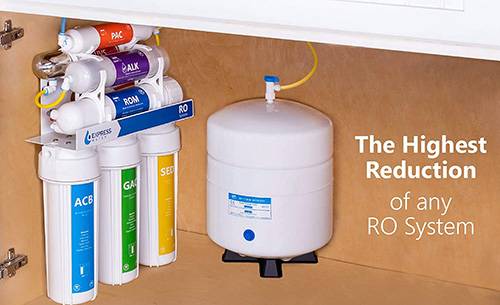
This isn’t what you want since that’ll equate to more dirty water. So, reverse osmosis is this procedure done with a slight push in the desired direction. With an electric water pump, the hard water gets pushed towards the soft water, being pushed through the membrane as it does so.
This semi-permeable membrane in between the two glasses of water has pores as small as 0.0001 microns to thoroughly clean out any solid impurities. The RO filter is, therefore, best used when you’re dealing with hard water.
Unfortunately, you do need electricity to operate this filter and there is relatively higher water wastage with these systems. With a ratio of 1:3 being used to flush the dirt respectively, there’s a bit of guilt partnered with these purification systems.
— Ultrafiltration
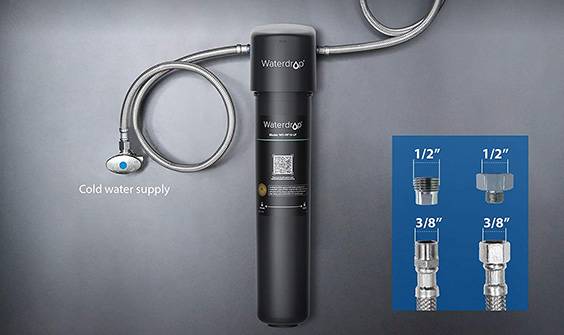
This filter is a friendlier option in comparison to the RO purification system. It uses no electricity and wastes less water with usage since the water naturally goes from the hard side to the soft through the membrane. This is because the membrane has larger pores (0.01 microns) and gravity pushes the water through the membrane.
The larger pores do mean that you can’t use this filter for hard water since particles such as dirt and sand will find their way through the pores.
— Ultraviolet Purification
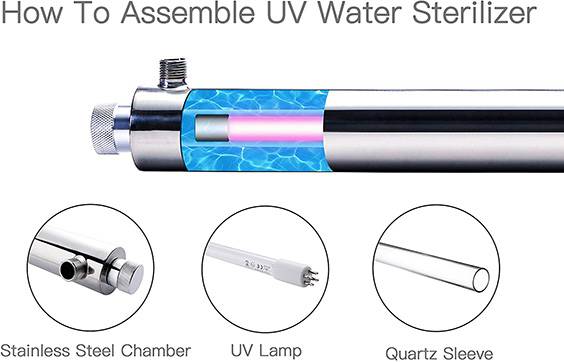
Ultraviolet filters are best for areas where bacteria and viruses have been recorded to be active in the water. The UV rays will kill and inactivate these disease-causing bacteria. Unfortunately, this is about all they do, so larger particles will still come through your taps if you rely solely on a UV filter.
For the best results, UV filters are partnered with other kinds of filters to clean both the visible and invisible invaders in your water.
— Gravity-Based Filters
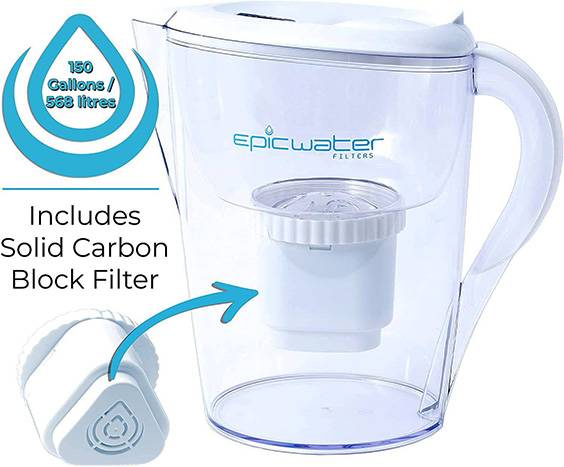
Finally, there are the simplest filters of all, the gravity-based filters. These are the filters you’ll find for taps, faucets, and pitchers. These filters use sediment and activated carbon filters. They can remove particles both large and small, from mud and sand to chemicals and microorganisms.
These are best for areas where purification doesn’t have to be intense and the overall TDS is relatively low.
Scale for Which Purifier to Use
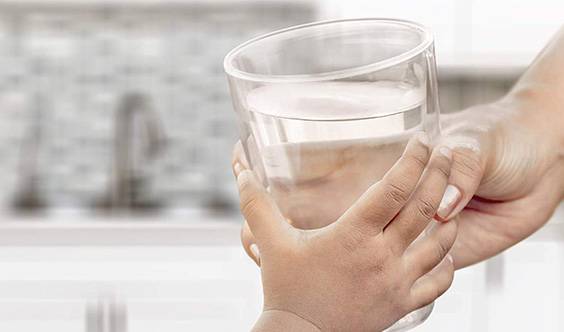
If you’re having trouble figuring out which purifier is best for your at-home use, then turn on the tap and see what comes out. Look up the TDS rating of water from your local hydro-system and see their ratings for biological and chemical concentration in the water. Then, you can make an educated decision on the right investment.
Below, we have also provided a table for you to compare the results to form a clearer idea of what purifiers can do the job for you.
| TDS Level | Un-Dissolved Impurities | Biological Impurities | Ideal Filter System |
| Underneath 500 ppm | No | No | Gravity-based |
| Underneath 500 ppm | No | Yes | UV |
| Underneath 500 ppm | Yes | No | UF |
| Underneath 500 ppm | Yes | Yes | UF + UV |
| Above 500 ppm | No | No | RO |
| Above 500 ppm | No | Yes | RO + UV |
| Above 500 ppm | Yes | No | RO + UF |
| Above 500 ppm | Yes | Yes | RO + UV + UF |
Best Water Purifier Reviews
1. Brita Basic Faucet Water Filter System
SPECS:
- Dimensions: 4.86” x 4.69” x 2.26”
- Filter System: Tap/Faucet Filter
- Filter Type: Standard Brita Filtration System
- Warranty: 1-year limited warranty
Best Overall Water Purifier
Brita is an extremely well-known and trusted brand for quality water purifying products, so it comes as no surprise that it lands a spot as the best overall water purifier.
These water purifiers attach to standard faucets, not pull-out or spray-style faucets. There are no tools required for the installation, so you won’t need professional help. The space-efficient design allows you to maneuver around the sink while doing dishes and getting water.
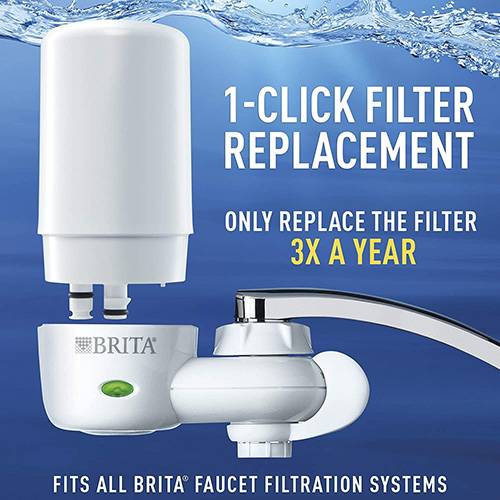
There are also 3 spray options to switch from; filtered, unfiltered, and unfiltered spray. Once the filter is full, an electronic filter indicator will flash red to remind you a replacement is required. The light will flash yellow to indicate that the filter is reaching the end of its life as a warning. This filter has an easy 1-click filter replacement, so there’s no hassle when taking the old one out and putting the new one in. The filter should be replaced every four months for the most efficient performance.
Always hand washes this water purifier, do not place it in the dishwasher as it’s not dishwasher compatible.
| Pros | Cons |
|
|
Who Should Buy This?
Brita is a widely trusted brand that can be found in models of all types, one of their most common being the tap/faucet addition. This gives you both unfiltered and filtered water at your ease and convenience.
2. Epic Pure Water Filter Pitcher for Drinking Water
SPECS:
- Dimensions: 5.5” x 10.5” x 10.5”
- Filter System: Water Pitcher Filter
- Filter Type: Gravity-Based Filter
- Warranty: No-hassle return policy
Best Water Purifier Pitcher
If you’re only interested in finding a filter for drinking water, then you can invest in a pitcher. These filters use a gravity-based filter which uses a solid carbon block to remove chemicals and chlorine odors. It manages to remove 2000% more contaminants than most other pitchers.
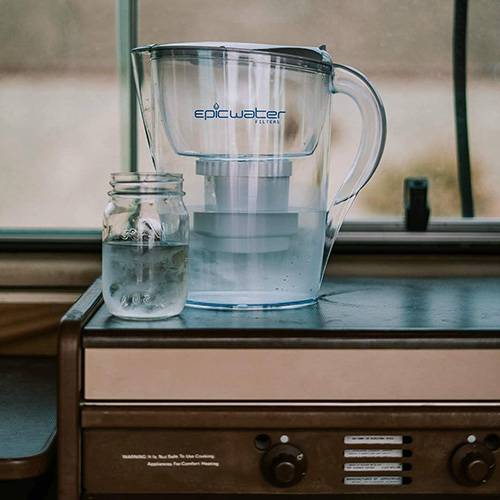
The smart filter removes all the unwanted particles and keeps the calcium and magnesium in the water for a healthier drink with every serving. One filter provides 150 gallons of freshwater before a replacement is needed. The construction of the pitcher is 100% BPA-Free, 100% Approved Food Grade Material, 100% recyclable and 100% vegan. The pitcher comes with a timer that counts down the days until you need to replace the filter inside.
If you’re not satisfied with your purchase, Epic Pure provides a 100% money-back guarantee to all customers. You can return the product for a full refund if you feel the pitcher does not meet the needs you expected or desired.
| Pros | Cons |
|
|
Who Should Buy This?
This pitcher is convenient in size and sufficiently filters the water that you drink. It can easily fit inside of your fridge shelf for cool, refreshing clean water whenever you want it.
3. APEC Water Systems ROES-50 Essence Series Reverse Osmosis Drinking Water Filter System
SPECS:
- Dimensions: 16” x 5.25” x 17.5”
- Filter System: Under the sink filter
- Filter Type: Reverse Osmosis
- Warranty: 1-year warranty
Best Reverse Osmosis Water Purifier
The most common as well as efficient method of filtration is the Reverse Osmosis filter. This filter cleans out 99% of contaminants and manages to clean out 1000+ contaminants from your water.
The system is both noise and trouble-free while in use, so it won’t interrupt or disturb your day-to-day life. The construction is 100% lead-free and uses certified JG Food-Grade tubing to be not only clean, but safe as well.
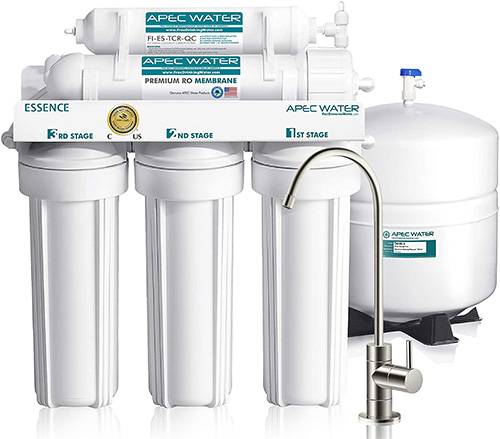
The system comes shipped with all parts included and industrial-grade instructions to ensure the set-up is quick and easy throughout. They even provide inclusive videos to help you get through the process easier. The leak-free quick-connect fittings need no additional tools or equipment for assembly. All you need is to clip them in place, and they’ll be locked and secured.
There are five filtration stages the water goes through; sediment to eliminates larger particles, two carbon blocks to catch bacteria and odors, an RO (reverse osmosis) membrane that cleans out all of the dissolved impurities, and finally, the coconut carbon filter will make sure you get well-tasting and refreshing water to drink.
| Pros | Cons |
|
|
Who Should Buy This?
The reverse osmosis membrane which cleans the particles out is a more efficient method of rigorously cleaning your water. If you live in an area where the water is hard, then you’ll need a heavier duty filter such as this one from APEC.
4. PUR PFM400H Faucet Water Filtration System
SPECS:
- Dimensions: 5.25” x 6.75” x 2.87”
- Filter System: MineralClear Core Filter with Activated Carbon
- Filter Type: Faucet/Tap Filter
- Warranty: 2-year limited warranty
Best Faucet Water Purification System
This filter from PUR is for sink faucets and taps. It’s easy to attach with no additional tools required. This cannot, however, be attached to pull-out or handheld faucets. You can choose between filtered and unfiltered water even when you have the purifier installed.
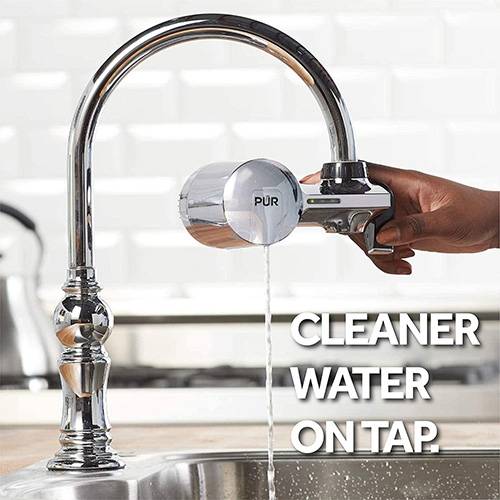
Once the filter is completely used up, the indicator will turn red to tell you it’s time for a change. You can use regular and PUR filters inside of this purification system, though PUR filters work relatively better. Each PUR filter will provide you with 100 gallons of clean freshwater, which is the same amount as 750 plastic water bottles. The filter needs replacement after a minimum of three months, which makes four times a year.
You do need batteries to use this purification system.
| Pros | Cons |
|
|
Who Should Buy This?
Not everyone needs an entirely new sink set-up to drink clean water. If you’re looking for something small and convenient, then a faucet system is the ideal choice for you. PUR’s faucet system has been known for its exceptional performance and trusted results.
5. Express Water UV Reverse Osmosis Water Filtration System
SPECS:
- Dimensions: 15” x 14” x 5”
- Filter System: Under the sink filtration system
- Filter Type: Reverse Osmosis and Ultraviolet
- Warranty: 1-year limited warranty
Best UV Water Purifier
This filtration system from Express Water is a combination of RO (reverse osmosis) and UV (ultraviolet) rays to make for efficient and reliable cleansing. This is the first and only option on the list which also provides its users with UV cleaning from viruses and waterborne diseases.
The installation is easy and practically done beforehand for you, so there’s no need for professional help upon delivery. Instructions and parts are all provided, with color-coded pieces to ensure where everything goes. The Quick Connect joints keep your filter secured and prevent future leakage.
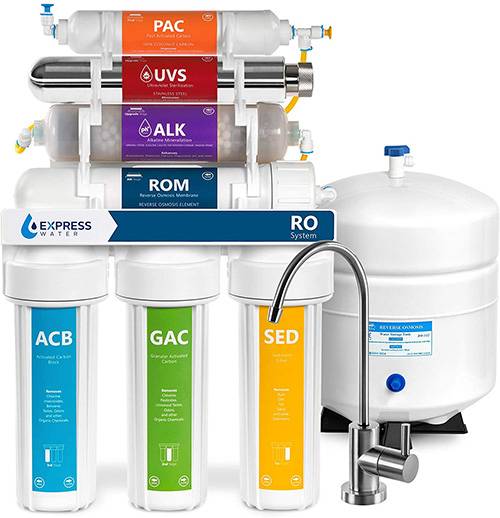
There are eleven different filtration levels inside of this purifier. With this purchase, you get sediment, carbon block, granular carbon filter, RO membrane, five layers of Alkaline filter, an ultraviolet sterilizer, and finally a post-activated carbon filter. The sediment, carbon block, and granulated active carbon layers should all be replaced twice a year while the RO membrane, post-carbon, and alkaline layers have to be replaced once.
| Pros | Cons |
|
|
Who Should Buy This?
This is the best option for anyone who has real, bacterial and virus issues related to their local water source. The ultraviolet rays will clean out or kill anything active within the water and the RO membrane will filter out all dissolved and undissolved unwanted particles.
Conclusion
Clean water doesn’t have to be impossible to get a hold of. With an at-home system, you can make the water from your tap the cleanest and safest it can be. With under-the-sink, faucet, and pitcher systems there is no choice that isn’t perfect for your requirements.
Remove the need and wastage plastic water bottles cause and replace them with a one-time investment that will stay and support you for years to come. Feel free to share and comment below on our recommendations.
